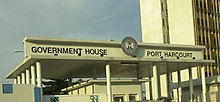| Governor of Rivers State | |
|---|---|
Incumbent Siminalayi Fubara since 29 May 2023 (Powers and duties suspended since 18 March 2025) Administrator Ibok Ekwe Ibas since 18 March 2025 | |
| Executive Branch of the Government of Rivers State | |
| Style | His Excellency |
| Member of | Executive Council |
| Residence | Brick House |
| Seat | Port Harcourt |
| Appointer | Direct Popular Vote |
| Term length | Four years, renewable once consecutively |
| Inaugural holder | Melford Okilo |
| Formation | 1 October 1967 |
| Deputy | Deputy Governor of Rivers State |
| Salary | ₦5,623,705 (2020) |
| Website | governor.riversstate.gov.ng |
The governor of Rivers State is the chief executive of the Rivers State government and is one of the governors of the thirty-six states of Nigeria. The governor is supported by the deputy governor, both popularly elected for a term of four years (maximum of two terms). The governor, as head of the executive branch, has the power to appoint and remove commissioners responsible for each of the state's ministries, the heads of parastatals and the state-owned bodies with specific regulatory or administrative duties. He appoints judicial officers based on the recommendation of the state judicial service commission. The Governor cannot be a member of the state's House of Assembly.


